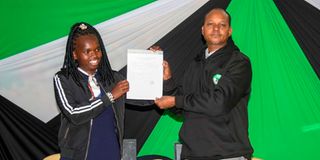Too few young women in the pool of elected leaders

Linet Chepkorir (Toto) the newly elected Bomet Woman Rep receives her certificate at Santa Giueseppina Bakhita Technical Institute Bomet County from IEBC returning officer Daniel Lenarum on August 12, 2022.
The past decade has seen an upsurge in the visibility of women’s involvement in political leadership in Kenya. That may be attributed to advocacy and laws that call for inclusion of women in decision-making processes.
Kenyan women made a historic breakthrough in the August 9 general election, winning seven gubernatorial seats—the highest number during the devolution era. Another 30 women have been declared elected MP, a slight increase from 23 in 2017.
We still have a long way to go as the incoming Parliament will still fail to meet the two-thirds gender rule, as per Article 27 of the Constitution. Only 1,962 female candidates were cleared by IEBC to contest in the elections against 14,137 men. The number lowers the probability of women winning an equitable number of elective seats. A direct consequence of this is the under-representation of women’s issues at policy, legislation and national budget levels.
National politics
The youth comprise 75 per cent of the population, the 2019 census results show. The median age in Kenya 19 years. But the influence of youth on national politics is limited. Only 4,508 youth candidates were cleared to contest in the elections with just about 20 of them getting elected.
Equally, there was very low new voter registration, the IEBC says, and poor turnout among the youth on Election Day. Which means the youth will continue to occupy the back seat of decision-making.
This underrepresentation is even more apparent among young women, who make half of the youth population. Only two female youth have been documented as having won elective seats. That is under one per cent of the number of successful candidates in the 2022 polls—which has been consistent over the past three elections. Several local studies show that the most disenfranchised and disengaged youth in governance are young women aged 18-25.
There is a need to increase the number of young women engaging in political processes as candidates and voters. We must end the discriminatory, patriarchal and conservative attitudes that define politics as preserve for men and traditional social norms that keep young girls out of school, leaving domestic responsibilities solely for women and girls.
Young women
As election gatekeepers, political parties can play a role in promoting young women’s participation in their leadership structures, in their candidate lists, provide young female candidates with appropriate training and support and allocating funds equally.
Training of women aspirants and candidates to enhance their knowledge and capacity to effectively compete—in their party primaries and general elections—should begin early for the participants to utilise the knowledge and skills acquired in good time. Starting civic and political education early and throughout the electoral cycle will contribute to the change in societal attitudes towards women and improve the voter turnout among young people.
Young women need to believe in their potential to lead by offering themselves for political leadership as an opportunity to shape the future of our nation.
Ms Maseno is the executive director, Badili Africa. [email protected]. @binamaseno



